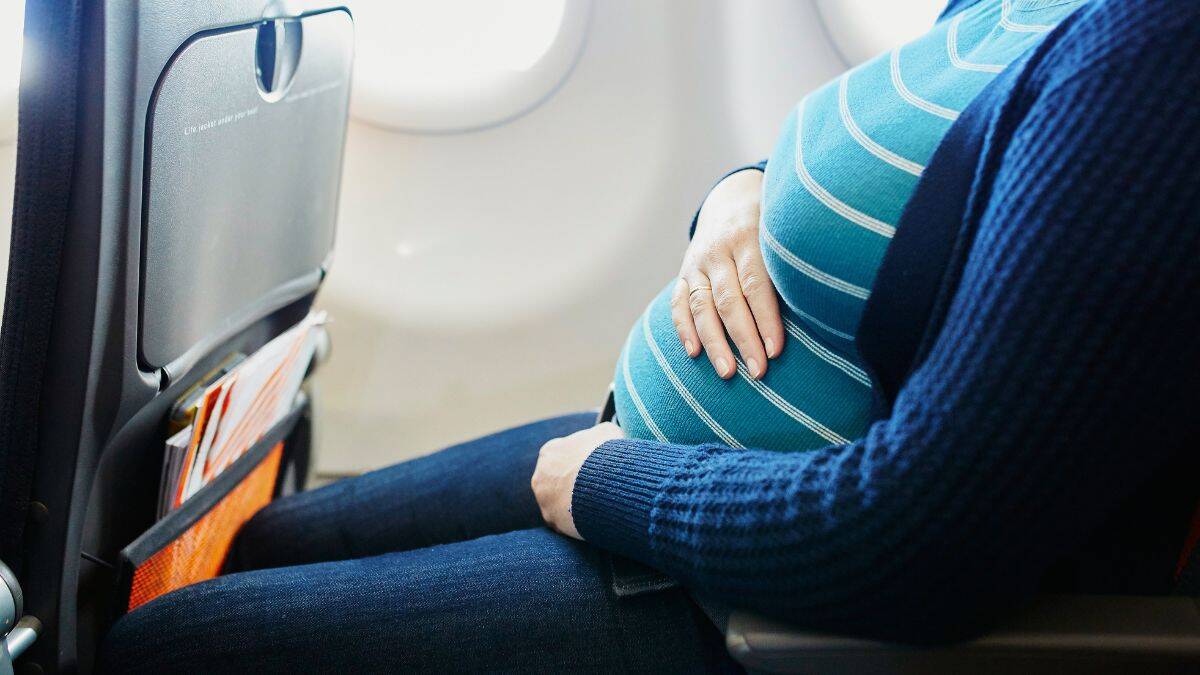Sharing is caring!
Traveling by plane with a baby can be both exciting and anxious, especially if this is your first pregnancy or first time flying. Whether for leisure, work or meeting family and friends, flying during pregnancy requires special care to ensure the safety and ease of the expectant mother and unborn child.
In this guide, we’ll share the important tips and factors an expectant mom should keep in mind when planning a flight, from talking to her healthcare provider and getting a discounted ticket, all the way to making sure her trip is as comfortable as possible.
Source: Unsplash
Talk to your doctor about air travel
Always consult your healthcare provider before booking any flights. Every pregnancy is unique and requires personalized advice from your doctor based on medical history, timing of pregnancy and any risks associated with flying.
Typically, a woman can get approval for air travel when she is in her second trimester (weeks 13 to 26). This is because morning sickness has usually stopped and the risk of premature birth is not as high. Even so, if you have health problems such as high blood pressure, diabetes, or a previous premature birth, it may be necessary to take more precautions during the flight or postpone your trip entirely.
Also, make sure you have all the vaccinations required for your final destination as well as a list of medications that are safe to take to deal with normal travel problems, such as illness or headaches. It is also important to receive a letter from your doctor showing your delivery date and confirming that you are safe to travel. Some airlines will ask for this documentation, especially if you are in the later stages of pregnancy.
Save on ticket prices and bring joy to your future
Budgeting for a baby isn’t easy and saving money for travel always helps. Fortunately, there are ways to save money while flying so that more of your money can be used for future pleasure.
To find the cheapest option, use an online fare comparison tool such as Google Flights. These will show you prices and travel dates on many airlines. Find a complete Google Flights guide online that will help you get the most out of this tool. Additionally, airlines often offer lower prices for those tickets purchased well in advance of the travel date. If your travel schedule allows for flexibility, you can find cheaper fares by choosing less popular travel dates, such as midweek flights.
You can also set up fare alerts on travel websites. They will notify you when prices drop on your chosen route and you can then book at the lowest cost possible. Also, check to see if using points or miles from an airline loyalty program or credit card can help reduce the cost of your flight. Some credit cards may also offer travel insurance, which may be beneficial during pregnancy.
Choose the right seat and airline
Low back pain, abdominal pain, and pelvic girdle pain occur in approximately 70% of pregnancies. The point is, pregnancy can be uncomfortable on land, but it is so in the sky. Making yourself as comfortable as possible is the most important thing. Your choice of seat and airline can greatly impact your travel experience.
An aisle seat is a good choice because it allows easier access to the restroom and gives you the freedom to stretch your legs, which is important. You can also choose seats in the bulkhead or exit row for extra legroom. It’s also important to check your airline’s rules for pregnant passengers, as some airlines set restrictions on travel after certain stages of pregnancy, and policies can vary widely.
Looking for airlines that offer amenities like extra legroom, comfortable seats, and in-flight entertainment may help make your trip more enjoyable. These amenities can help reduce the discomfort of flying during pregnancy and make your trip even better.
Source: Unsplash
Stay comfortable during your flight
Wearing loose, breathable clothing and comfortable shoes can help you feel good. Wearing compression stockings can help stop swelling and reduce the risk of deep vein thrombosis (DVT). Drink enough water before and during the flight as it is often found that dehydration is more likely to occur when we are in the air. It is recommended not to drink caffeine or drinks containing a lot of sugar, as these can also lead to dehydration.
Walking on the walk every hour, even for a short time, can improve circulation and reduce the chance of deep vein thrombosis. If you can’t move around, doing some light movement, such as moving your ankles in circles or pushing your feet up and down while seated, can still help. To prevent discomfort and bloating on a long-haul flight, it’s best to eat a light meal before boarding and bring healthy snacks with you. To make your journey easier, you can choose not to eat foods that contain a lot of salt or produce gas. Bringing a neck pillow, eye mask, and blanket can help you sleep better on the plane so you’ll feel less tired and more relaxed when the plane lands at your final destination.
bottom line
Air travel during pregnancy can be safe and enjoyable if you plan properly ahead of time and take the necessary steps. You must consult with your healthcare provider, choose the correct seat and airline, and stay as comfortable as possible throughout your flight. Don’t forget to pay attention to your body’s signals, stay up to date on pregnancy-related information, and always prioritize staying healthy while traveling.
Revealed: Collaborative Post
Thanks for reading – if you like this content, please consider buying me a coffee here or browsing my Amazon Wishlist, I really appreciate your support, it helps keep the site running and my time 🙂




